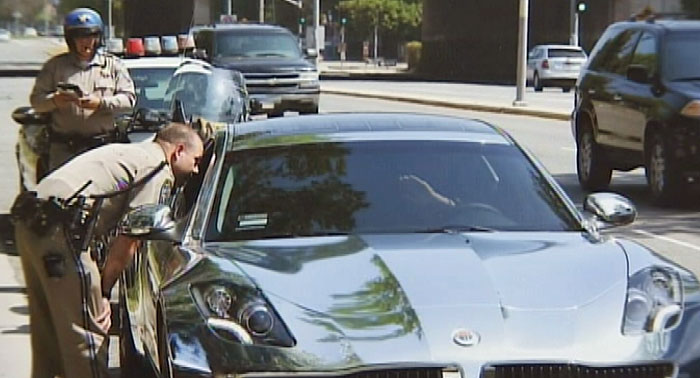In a case involving teen pop star Justin Bieber, a judge dealt a blow Wednesday to a California law meant to crack down on reckless driving by paparazzi, saying the statute is overly broad.
The case from Los Angeles prosecutors against self-employed freelance celebrity photographer Paul Raef stemmed from a high-speed pursuit of Bieber that took place in July on the Hollywood (101) Freeway in the San Fernando Valley.
It was the first time a photographer had been charged under at 2010 state law that raised the penalty for those who drive dangerously in pursuit of photos for commercial gain.
The offense is punishable by six months in jail and a $2,500 fine but had gone unused until Raef was involved in the freeway chase of Bieber that topped 80 mph and prompted several 911 calls.
Superior Court Judge Thomas Rubinson dismissed counts filed under the law against Raef, who allegedly chased Bieber's chrome-coated Fisker Karma, pictured below, along with other paparazzi. LA City Councilman Dennis Zine, a reserve police officer who witnessed the chase, described the pursuit as a "horrific" traffic situation.
In court, Rubinson cited numerous problems with the paparazzi statute, saying it was aimed at newsgathering activities protected by the First Amendment, and that lawmakers should have simply increased the penalties for reckless driving rather than targeting celebrity photographers.

He also said the law could be used against photographers rushing to shoot a wedding or political rally, or even a private citizen such as himself on the way to an event that might generate photos worth selling.
Local
Get Los Angeles's latest local news on crime, entertainment, weather, schools, COVID, cost of living and more. Here's your go-to source for today's LA news.
Assistant City Attorney Ann Rosenthal said hours after the ruling that her office would appeal. The judge put the case on hold until the appeal is resolved.
While the media is granted freedom under the First Amendment, its latitude to gather news is not unlimited, she said.
"This activity has been found to be particularly dangerous," she said of chases involving paparazzi.
Rubinson's ruling only affects Raef's case, but the law could be struck down completely by the appellate court, said Brad Kaiserman, an attorney for Raef.
Kaiserman argued the statute was unconstitutional and meant to protect celebrities, not the public.
Raef still faces traditional reckless driving counts and has not yet entered a plea on those charges.



